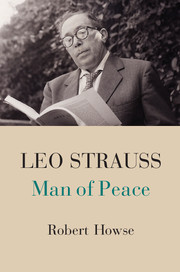Book contents
- Frontmatter
- Dedication
- Contents
- Preface and Acknowledgments
- 1 Introduction
- 2 Warrior Morality and the Fate of Civilization
- 3 Legitimacy and Legality, Thinking and Ruling in the Closed Society and the World State
- 4 Strauss’s Machiavelli
- 5 Thucydides versus Machiavelli
- 6 Justice and Progress
- 7 Conclusion
- Abbreviations
- Index
- References
1 - Introduction
Reopening the Case of Leo Strauss
Published online by Cambridge University Press: 05 September 2014
- Frontmatter
- Dedication
- Contents
- Preface and Acknowledgments
- 1 Introduction
- 2 Warrior Morality and the Fate of Civilization
- 3 Legitimacy and Legality, Thinking and Ruling in the Closed Society and the World State
- 4 Strauss’s Machiavelli
- 5 Thucydides versus Machiavelli
- 6 Justice and Progress
- 7 Conclusion
- Abbreviations
- Index
- References
Summary
This book reconsiders the views of Leo Strauss on the relationship of philosophy and law to political violence – the aspect of Strauss’s scholarship that has been most publicly controversial and where his intentions have been most vehemently disputed. Around the time of the Iraq War, a bevy of books and articles appeared claiming Strauss and his followers had inspired the foreign and defense policies of the George W. Bush administration. Scholars and journalists alike scoured Strauss’s difficult and erudite works about political thinkers such as Machiavelli and Thucydides. They purported to discover cleverly placed and shrewdly veiled messages of bellicose imperialism, war without limits, and unbounded executive power – the doctrines they suspected Strauss of teaching orally to a closed circle of disciples.
Here I contest these charges through reinterpreting Strauss’s published work in light of the lectures and seminars he gave to his students, which have become available over the last few years. Strauss, I argue, offers a new, classically inspired philosophy of political violence, but one based on a strong preference for peace over war. This philosophy holds that there are circumstances in which the use of violence is a justified necessity, a radically different proposition from arguing against all moral and legal constraints on war. As Strauss puts it, “Socrates was a man of peace rather than of war. It should go without saying that a man of peace is not the same as a pacifist” (XSD, p. 89).
- Type
- Chapter
- Information
- Leo StraussMan of Peace, pp. 1 - 24Publisher: Cambridge University PressPrint publication year: 2014



